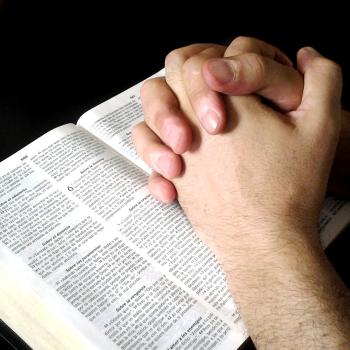For a while in the 20th century, it was common for churches and ministries to use the word “crusade” to describe major evangelistic events – a Gospel “crusade,” a children’s ministry “crusade,” etc.
The word can mean any political, social, or religious effort towards change, so it’s a legit usage, and the heart of these Christian events was certainly in the right place, wanting to introduce people to Jesus.
But given the word’s connotation from Church history, eventually we realized that the term wasn’t one that we should be using, and rightly so.

Image via Pixabay
In 1095 AD, Pope Urban II gave a passionate speech to a group of nobles and clergy, decrying the Muslim possession of the Holy Land and calling upon Christian kings to violently expel the “trespassers,” take Jerusalem back, and reap the benefits of wealth, glory, and the automatic forgiveness of sins as they did so.
“Deus volt!” became the rallying cry. “God wills it!” in Latin.
It was the trigger point that launched the Crusades, a series of bloody conflicts between Christian and Muslim nations as they violently battled over control of Palestine. Christian soldiers became known as “Crusaders.”
Undoubtedly atrocities were committed on both sides, but as a Christian column we must denounce the actions of the followers of the “love your enemies” Messiah, who spent centuries not only killing their enemies but also slaughtering innocent men, women, and children of different religions, all in the Name of Jesus.
In some cases, nonbelievers were given the choice between conversion to Christ, or death. Many chose death rather than compromise their own convictions. It is hard to imagine that very many of those who did convert did so out of any heartfelt devotion to Jesus.
It is telling that Muslims still regularly use the term “Crusaders” to refer to the West. They have not forgotten what Christians did all those centuries ago
And while the tactics of violence and death used by our spiritual ancestors are thankfully not tools that the North American Church embraces today, elements of that “Crusader culture” linger in the Church nonetheless.
This Crusader mentality seeks to enforce God’s will on earth, to make it happen, whether people are seeking it or not. It desires to bring about God’s Kingdom, forcefully if necessary.
In the Middle Ages, this regularly happened with the edge of a sword.
In more modern times, violence is less likely to be used. It is more likely to be political power that is wielded in order to force God’s agenda to come about.
If we can just get the right people elected, if we can just get the right laws passed, if we can just get certain sins outlawed, then God’s will can be done, and then blessing will finally come to our nation.
The Crusader culture seeks to dominate, to rule, to take over, to subject others to God whether they like it or not, whether they are believers or not.
And this would be completely counter to the way of Jesus.
If this approach was the way of Jesus, then why didn’t He do it? Why didn’t He seek political power, wealth, influence, raise an army, take a throne, establish an earthly Kingdom?
Why didn’t He come in glory and majesty, dominate over His enemies, and enforce His agenda by His power, whether people wanted it or not?
Instead, Jesus comes humbly (Mt 11.29). He is poor (2Co 8.9). He has no political power whatsoever, nor does he require it (Jn 18.36). There is no army. There is no earthly throne.
Jesus doesn’t make anyone follow Him. He preaches the Word boldly, but not coercively. He invites followers, but He does not force them (Mt 4.19; 8.22; 9.9).
And He does so from a place of radical humility, washing feet and serving others (Jn 13; Phil 2.1-11). He chooses the lowest place, not the top. He loves His enemies, and does not kill them (Lk 23.34). He calls us to do the same (Mt 5.43-48).
He calls for neither a literal nor a political battle against those who oppose Him. Rather, He likens the Kingdom of God as being like a tiny seed that slowly grows into something massive, or like a little yeast that works its way through a large batch of dough (Mt 13.31-33).
The way of Christ starts off small, subtle, low-key, humble. There is not a lot of glory in it. There is little if any earthly power in it.
But over time, this Kingdom works its way through the world, spreading and expanding as it goes. By the end it is massive.
It takes time. It cannot be forced.
This does not sound like the Crusader mentality, in our past or our present.
Hopefully no Christian is looking at the medieval Crusaders as models to aspire to, especially in their violence.
But as a similar attitude can linger in the air of the Church, even if non-violent, we do see Christians seeking the path of power, desiring to enforce God’s will from the top-down.
And to be clear, there is certainly a place for the Christian to speak up, to publicly fight for justice, to let their light shine in the political arena, and we certainly can use our rights as citizens for the cause of the Kingdom, as Paul did (Ac 22.22-29; 25.11-12).
Anabaptists, in their appreciation for the separation of Church and State, have at times withdrawn from doing these things, and we don’t need to go that far in the other direction either.
The real question is to what extent our tactics are looking like the ways of Jesus, or not.
The way of Christ is ultimately not the way of worldly power, ladder-climbing, coercion, or forcing unbelievers to submit to God’s will.
It is the way of peace, humility, invitation, and influence, boldly sharing the Word, pointing others towards knowing Jesus, and always encouraging them to come along with us on the journey.
********
If you’re enjoying what you read, you can follow Third Way Christians on Facebook or Instagram, or sign up to get new columns emailed to you here! As well, you can track along with Chris’ church teaching at Meadow Brook Church’s YouTube page!












